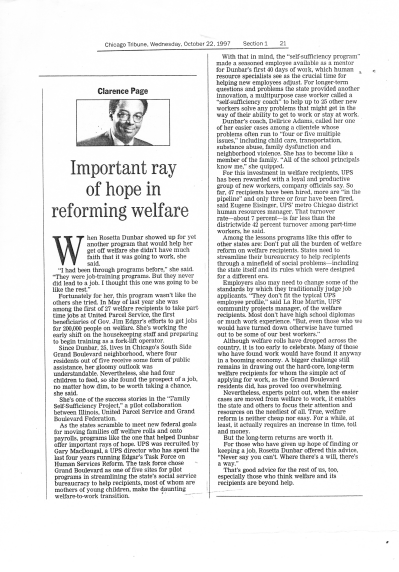Chicago Tribune
10/22/1997
Copyright Chicago Tribune 1997
Clarence Page
 When Rosetta Dunbar showed up for yet another program that would help her get off welfare she didn't have much faith that it was going to work, she said.
When Rosetta Dunbar showed up for yet another program that would help her get off welfare she didn't have much faith that it was going to work, she said.
"I had been through programs before," she said. "They were job-training programs. But they never did lead to a job. I thought this one was going to be like the rest."
Fortunately for her, this program wasn't like the others she tried. In May of last year she was among the first of 27 welfare recipients to take part-time jobs at United Parcel Service, the first beneficiaries of Gov. Jim Edgar's efforts to get jobs for 200,000 people on welfare . She's working the early shift on the housekeeping staff and preparing to begin training as a fork-lift operator.
Since Dunbar, 25, lives in Chicago's South Side Grand Boulevard neighborhood, where four residents out of five receive some form of public assistance, her gloomy outlook was understandable. Nevertheless, she had four children to feed, so she found the prospect of a job, no matter how dim, to be worth taking a chance, she said.
She's one of the success stories in the "Family Self-Sufficiency Project," a pilot collaboration between Illinois, United Parcel Service and Grand Boulevard Federation.
As the states scramble to meet new federal goals for moving families off welfare rolls and onto payrolls, programs like the one that helped Dunbar offer important rays of hope. UPS was recruited by Gary MacDougal , a UPS director who has spent the last four years running Edgar's Task Force on Human Services Reform. The task force chose Grand Boulevard as one of five sites for pilot programs in streamlining the state's social service bureaucracy to help recipients, most of whom are mothers of young children, make the daunting welfare -to-work transition.
With that in mind, the "self-sufficiency program" made a seasoned employee available as a mentor for Dunbar's first 40 days of work, which human resource specialists see as the crucial time for helping new employees adjust. For longer-term questions and problems the state provided another innovation, a multipurpose case worker called a "self-sufficiency coach" to help up to 25 other new workers solve any problems that might get in the way of their ability to get to work or stay at work.
Dunbar's coach, Dellrice Adams, called her one of her easier cases among a clientele whose problems often run to "four or five multiple issues," including child care, transportation, substance abuse, family dysfunction and neighborhood violence. She has to become like a member of the family. "All of the school principals know me," she quipped.
For this investment in welfare recipients, UPS has been rewarded with a loyal and productive group of new workers, company officials say. So far, 47 recipients have been hired, more are "in the pipeline" and only three or four have been fired, said Eugene Eisinger, UPS' metro Chicgao district human resources manager. That turnover rate--about 7 percent--is far less than the districtwide 42 percent turnover among part-time workers, he said.
Among the lessons programs like this offer to other states are: Don't put all the burden of welfare reform on welfare recipients. States need to streamline their bureaucracy to help recipients through a minefield of social problems--including the state itself and its rules which were designed for a different era.
Employers also may need to change some of the standards by which they traditionally judge job applicants. "They don't fit the typical UPS employee profile," said La Rue Martin, UPS' community projects manager, of the welfare recipients. Most don't have high school diplomas or much work experience. "But, even those who we would have turned down otherwise have turned out to be some of our best workers."
Although welfare rolls have dropped across the country, it is too early to celebrate. Many of those who have found work would have found it anyway in a booming economy. A bigger challenge still remains in drawing out the hard-core, long-term welfare recipients for whom the simple act of applying for work, as the Grand Boulevard residents did, has proved too overwhelming.
Nevertheless, experts point out, when the easier cases are moved from welfare to work, it enables the state and others to focus their attention and resources on the neediest of all. True, welfare reform is neither cheap nor easy. For a while, at least, it actually requires an increase in time, toil and money.
But the long-term returns are worth it.
For those who have given up hope of finding or keeping a job, Rosetta Dunbar offered this advice, "Never say you can't. Where there's a will, there's a way."
That's good advice for the rest of us, too, especially those who think welfare and its recipients are beyond help.